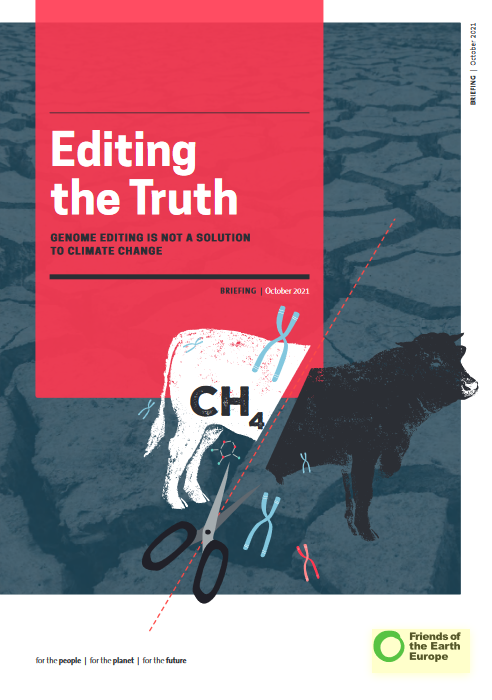New report details why gene editing in not a solution to climate change

Published: December 7, 2021
Category: GMO News
A new report from Friends of the Earth Europe, “Editing the Truth: Genome Editing is Not a Solution to Climate Change” describes how proponents of new gene editing techniques are making the same empty claims that were made about “older” genetic engineering techniques about feeding the world.
Agriculture is caught in a vicious loop. Industrial farming and especially industrial animal feed production is a major driver of greenhouse gas emissions and climate change, and the agricultural sector is struggling to cope with the consequences of that climate disruption. Rising temperatures, extreme weather events and unpredictable conditions threaten agricultural production, which in turn jeopardizes the food production.
Effective solutions must be two-pronged: to both reduce the environmental impact of agriculture, and to make the sector more resilient to climate impacts.
Biotech companies claim to have the answer: new genetically modified organisms (GMOs). For over twenty years, the biotech industry has promised silver bullets to production problems—plants more resilient to drought, crops less dependent on fertilizers, and other technologies that have never materialized.
Two decades later and there’s been no sign of these technologies reaching the market. Now the same biotech corporations are promoting a new generation of GMOs, with a slew of new unsubstantiated promises. One example is CRISPR, a tool which they claim could edit DNA to add or suppress gene traits in plants or animals. The biotech lobbyists are asking the European Commission to deregulate these new GMOs, and reject all evidence of attached risks.
Even if successful, this unproven science offers only a potential short-term relief of the symptoms of an unsustainable farming industry. In the meantime, it is diverting time, investment and attention away from real and already-proven solutions like agroecology—and risks releasing genetic edits into nature which we can’t control.
Agroecological farming techniques—which produce the majority of the world’s food—prioritize production adapted to local conditions and farming in balance with nature, and are the most efficient solutions to the climate crisis in the farming sector.
The report can be accessed at
Organic & Non-GMO Insights December 2021








